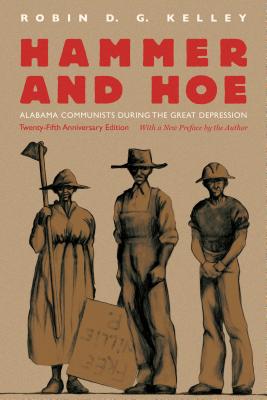

 University of North Carolina Press
University of North Carolina Press
Hammer and Hoe: Alabama Communists During the Great Depression


Key Metrics
- Robin D G Kelley
- University of North Carolina Press
- Paperback
- 9781469625485
- 8.8 X 6 X 1.2 inches
- 1.25 pounds
- History > United States - State & Local - South (AL,AR,FL,GA,KY,LA,MS,NC,SC,TN,VA,WV)
- English
 Secure Transaction
Secure TransactionBook Description
The Alabama Communist Party was made up of working people without a Euro-American radical political tradition: devoutly religious and semiliterate black laborers and sharecroppers, and a handful of whites, including unemployed industrial workers, housewives, youth, and renegade liberals. In this book, Robin D. G. Kelley reveals how the experiences and identities of these people from Alabama's farms, factories, mines, kitchens, and city streets shaped the Party's tactics and unique political culture. The result was a remarkably resilient movement forged in a racist world that had little tolerance for radicals.
After discussing the book's origins and impact in a new preface written for this twenty-fifth-anniversary edition, Kelley reflects on what a militantly antiracist, radical movement in the heart of Dixie might teach contemporary social movements confronting rampant inequality, police violence, mass incarceration, and neoliberalism.
Author Bio
My research has explored the history of social movements in the U.S., the African Diaspora, and Africa; black intellectuals; music and visual culture; Surrealism, Marxism, among other things. My essays have appeared in a wide variety of professional journals as well as general publications, including the Journal of American History, American Historical Review, The Nation, Monthly Review, New York Times, Color Lines, Counterpunch, Souls, Black Renaissance/Renaissance Noir, Social Text ,The Black Scholar, Journal of Palestine Studies, and Boston Review, for which I also serve as Contributing Editor.
My books include, Africa Speaks, America Answers: Modern Jazz in Revolutionary Times (Cambridge: Harvard University Press, 2012); Thelonious Monk: The Life and Times of an American Original (The Free Press, 2009); Freedom Dreams: The Black Radical Imagination (Beacon Press, 2002); with Howard Zinn and Dana Frank, Three Strikes: The Fighting Spirit of Labor's Last Century (Beacon Press, 2001); Yo’ Mama’s Disfunktional!: Fighting the Culture Wars in Urban America (Boston: Beacon Press, 1997); Race Rebels: Culture, Politics, and the Black Working Class (New York: The Free Press, 1994); Into the Fire: African Americans Since 1970 (New York: Oxford University Press, 1996) [Vol. 10 of the Young Oxford History of African Americans series]; Hammer and Hoe: Alabama Communists During the Great Depression (Chapel Hill, NC: University of North Carolina Press, 1990).
I am also co-editor of the following books: Walter Rodney, The Russian Revolution: A View From the Third World (with Jesse Benjamin (New York: Verso, 2018); The Other Special Relationship: Race, Rights and Riots in Britain and the United States (with Stephen Tuck) (New York: Palgrave, 2015); Black, Brown and Beige: Surrealist Writings from Africa and the African Diaspora (with Franklin Rosemont) (Austin: University of Texas Press, 2009); To Make Our World Anew: A History of African Americans (with Earl Lewis) (Oxford University Press, 2000), volumes 1 and 2; Imagining Home: Class, Culture, and Nationalism in the African Diaspora (with Sidney J. Lemelle) (London: Verso Books, 1995); and the eleven volume Young Oxford History of African Americans (with Earl Lewis) (1995-1998).
I am currently completing three book projects:
Black Bodies Swinging: An American Postmortem (Metropolitan Books) is a genealogy of the Black Spring protests of 2020 by way of a deep examination of state-sanctioned racialized violence and a history of resistance. To understand how we arrived at this moment requires a different kind of autopsy—an historical postmortem that can lay bare the structural conditions responsible for premature death. Borrowing a metaphor from Abel Meeropol’s iconic song “Strange Fruit,” the book traces the deaths and the lives of our most recent casualties to the “blood at the root”—the racial terror at the base of our system of exploitation and wealth accumulation. The blood at the root is “racial capitalism.” The kind of historical autopsy I am proposing is intended to make visible the history and workings of racial capitalism.
It exposes not only effects of racist policing but the extraction of wealth from black people, land dispossession, displacement, predatory lending, taxation, disfranchisement, environmental catastrophe, and the long history of looting through terror and government policies that suppressed black wages, relieved us of property, excluded black people from better schools and public accommodations, suppressed black home values, and subsidized white wealth accumulation. But Black Bodies Swinging is also a history of resistance, arguing that the new abolitionists represent the “Third Reconstruction generation” whose organizational genesis begins in the 1990s but whose political lineage can be traced back to slavery and settler colonialism.
I am also completing a biography of the late Grace Halsell, tentatively titled The Education of Ms. Grace Halsell: An Intimate History of the American Century. The Texas-born journalist, granddaughter of Confederate slave owners, daughter of a once wealthy cattle rancher and Indian fighter, began her career as a correspondent for several Texas papers during the 1940s and 50s, eventually worked as a staff writer for President Lyndon B. Johnson, before setting out in 1968 to chemically darken her skin and live as a black woman for a year.
She published the best-selling Soul Sister: The Journal of a White Woman Who Turned Herself Black (1969). She would go on to write twelve more books, including an expose about living as a Navajo and working as a domestic in a California suburb (Bessie Yellowhair), a book about passing as an undocumented worker from Mexico (The Illegals), and several other unrelated texts. She traveled to Israel and Palestine in 1980 and wrote a book sharply critical of the occupation. As a result, jobs, lucrative book contracts, and other opportunities began to disappear. She died in 2000 from multiple myeloma cancer caused largely by the drugs she had taken to turn herself brown.
Finally, I am collaborating with Professor Tera Hunter on a general survey of African American history.
Source: University of California at Los Angeles
Videos










Community reviews
Write a ReviewNo Community reviews